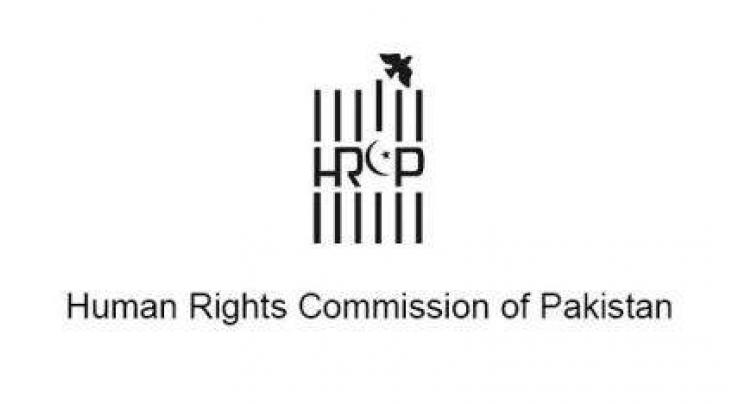
HRCP Holds Meeting; Discusses Labour Issues In ICT
Muhammad Irfan Published September 27, 2022 | 07:31 PM

Human Rights Commission of Pakistan (HRCP) held a meeting here on Tuesday to discuss the issues facing working class in the Islamabad Capital Territory (ICT) and to analyze the legal and constitutional structure in place to deal with their rights and liabilities
ISLAMABAD, (UrduPoint / Pakistan Point News - 27th Sep, 2022 ) :Human Rights Commission of Pakistan (HRCP) held a meeting here on Tuesday to discuss the issues facing working class in the Islamabad Capital Territory (ICT) and to analyze the legal and constitutional structure in place to deal with their rights and liabilities. The event was attended by human rights activists, trade union leaders, teachers, labour groups and officials from ICT labour department.
The speakers included former senator and council member of HRCP Farhat Ullah Babar, HRCP council member Naseen Azhar; Director Labor Department ICT Mahreen Baloch; and former assistant advocate general Punjab Akram Khuram Advocate.
In her opening remarks, council member of HRCP Nasreen Azhar lamented that the working class in the country has been forced to work and live in a miserable conditions, but, the authorities continue to overlook their problems.
Director Labour Department ICT, Mahreen Baloch briefed the participants about the existing Federal labour laws and policies which have been devised to safeguard the legal and constitutional rights of working class employed in federal industries.
She claimed that the labour department has been working to establish an online registration mechanism to create awareness among labour personnel about labour laws and policies.
She asked for necessary amendments in several laws to make them more effective and compliant with the international labour standards. She also urged the government to establish a centralized registration center, and center of excellence.
Former assistant advocate general Punjab, Akram Khuram apprised the participants that the country's labour laws and policies have not been in compatible with the ILO Conventions and protocols relating to working hours, wages for overtime, holidays, minimum wages, equal compensation disregard of gender, and occupational safety. The authorities concerned both at national and provincial levels must devise a robust mechanism for the enforcement of international and national labour laws and those found in violation of them must be made accountable and penalized for their wrongdoings to ensure the protection of rights of working class in the country.
The general secretary of Pakistan Workers Confederation Akram Bunda emphasized the need to convene a national tripartite conference so that all three main stakeholders sit together and deliberate over this crucial issue.
Bunda urged the authorities to introduce necessary reforms in the national laws so that they are made consistent with ILO's Conventions ratified by Pakistan. Further, the federal ministry of labour be empowered, a uniform policy across all provinces be devised and ILO Convention on health and safety be ratified, and all labour laws, particularly welfare labour laws be enforced. He added that laborers working in informal sector should be granted with the rights to form associations.
Female teachers, CDA union representatives, and hotel trade union leaders and sanitary workers deplored the fact that a large number of workers are destitute of minimum wages, welfare benefits, job security, right to form association and occupational safety equipment.
Former senator and HRCP Council member Farhat Ullah Baber drew participants' attention towards the issue facing domestic workers who are among the most ignored, unsecured and underprivileged section of the society.
At the end of the event, following recommendations were unanimously approved: A tripartite conference without further delay is need of the hour to find suitable solutions of the issues facing labor sector. But, to make the conference a success, labour has to be united and launch an organized struggle for their rights.
Sanitary workers should not be compelled to get into the sewer line because it poses danger to their lives.
The informal labour must be regularized and mainstreamed to address their long held grievances and forge unity among the labor class;The mechanism of collective bargaining be strengthened.
Related Topics
Recent Stories

President Raisi leaves for Iran from Karachi

Currency Rate In Pakistan - Dollar, Euro, Pound, Riyal Rates On 24 April 2024

Today Gold Rate in Pakistan 24 April 2024

Punjab CM inaugurates Pakistan’s first Virtual Women Police Station

Dutch model Donny Roelvink embraces Islam

Experts raise concerns over introduction of 10-stick packs

Iranian president arrives in Karachi

Law Minister expresses Govt's resolve to address issue of missing persons

Rizwan’s batting order may be changed: Sources

Nawaz Sharif to visit Guangzhou exhibition in China

FM Dar not traveling to China: Foreign Office

PM takes notice of deliberate delay in tax cases
More Stories From Pakistan
-
Steps under way for expediting cotton cultivation
2 minutes ago -
DC, MPA visited Mianwali Bangalow
2 minutes ago -
IG jail Punjab pays his annual visit
2 minutes ago -

President Raisi leaves for Iran from Karachi
23 minutes ago -
Iranian President leaves after 3-day Pakistan visit
32 minutes ago -
Iranian President reiterates commitment to promote bilateral relation with Pakistan
10 hours ago
-
KP CM chairs meeting of Integrated Security Architecture’s apex committee
11 hours ago -
President Raisi accorded warm welcome on arrival in Karachi
11 hours ago -
Spending quality time in nature may lower heart disease, diabetes risk: Study
11 hours ago -
President Raisi pays respects at Quaid's mausoleum
12 hours ago -
FM Dar speaks to overseas Pakistanis via Zoom
12 hours ago -
Govt to form parliamentary committee to end violence in Balochistan: CM Bugti
12 hours ago
